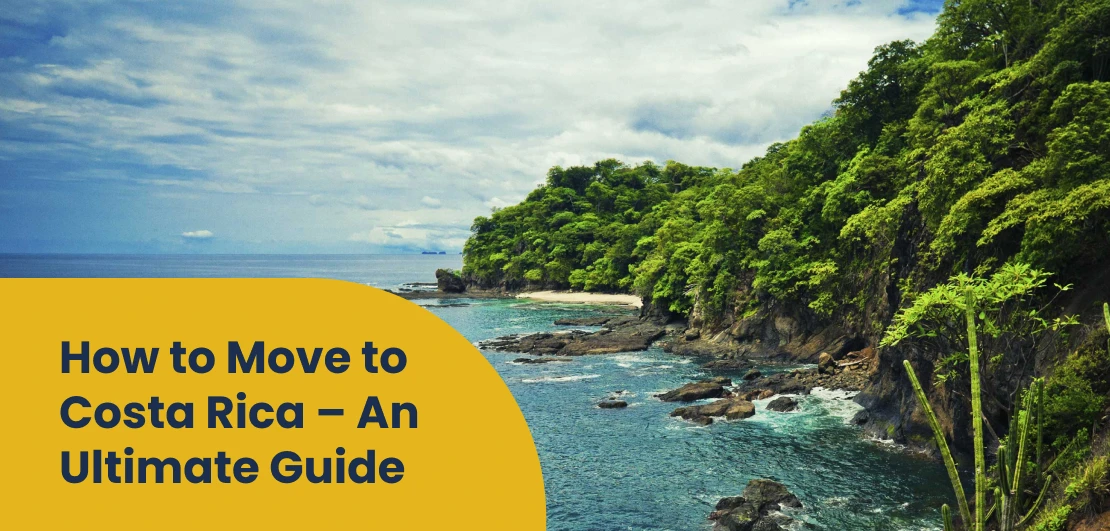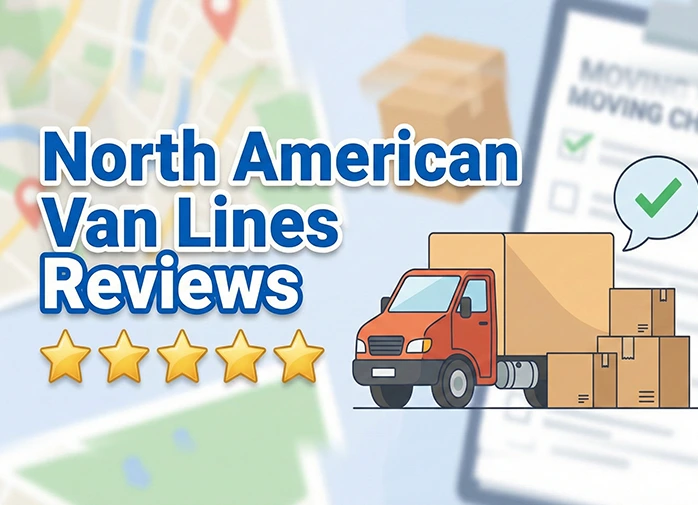How to Move to Costa Rica – An Ultimate Guide

Costa Rica is often called the “happiest country in the world” due to its pure philosophy. It generally offers an affordable cost of living, with housing costs ranging from $700 to $3,500. To live legally in Costa Rica, you’ll need a work permit and temporary residency. The job market of Costa Rica can be competitive for foreigners. It is the right place to move as it has a universal healthcare system that is ranked among the top 20.
It is considered a safe place to live, especially in tourist areas, and violent crimes are rare. This has a highly diverse culture with an extensive range of cuisine, and community feel.
Relocating to such an incredible place is a dream for many, but how will everything be handled and managed? At this point, you need professionals and experts by your side to help you plan a move. Each move is different, and experts at Van Lines Move can help you plan your move, irrespective of distance. Let’s dive deep into How to Move to Costa Rica, covering all the essential factors you need to consider before making the move!
Why Choose Costa Rica?
Moving to Costa Rica is a big decision, but the country has been a target country for many people because it consistently ranks high on the “happiest country” lists. Relocating to Costa Rica can be challenging, so before you plan your move start exploring the benefits of moving there-
- The “Pura Vida” Lifestyle- The national motto is “pure life” which signifies a laid-back optimistic and grateful approach to living. If you move here, you will enjoy a slower pace of life focusing on simple pleasures. It offers an improved work-life balance with a less-stressed lifestyle.
- Sustainability and Conservation- Costa Rica is a global leader in environmental protection and as a result, more than a quarter of the country has protected surface with 28 national parks, 58 wildlife refuges, and numerous other reserves. The country has doubled its forest cover since 1990. It is a major energy provider that considers renewable sources like wind, solar, and geothermal power.
- Quality of life- It offers a high quality of life with strong social safety, robust public services, and accessible healthcare and education initiatives. It has high family values with a strong sense of community.
- Safety- Violent crimes are rare in the country, however, petty crimes can occur. There are strong rules and respect for human rights.
- Growing Expat Community- Costa Rica has a large and growing expat community in popular areas like the Central Valley, Guanacaste, and the Central Pacific coast.
- Residency options- Costa Rica offers streamlined residency programs tailored to different situations including retirees, and rentistas.
Best Places to Live in Costa Rica
Costa Rica offers a lot to its residents, and each locality has something to offer to all the residents. Here are some popular places to live in Costa Rica-
Coastal Towns-
- Tamarindo- This coastal town in Costa Rica offers a vibrant lifestyle and relaxation with adventure. The town offers beautiful beaches and outdoor activities like surfing, swimming, and other water sports. It has a welcoming international community with friendly and generous people. It offers a rich cultural experience with a relaxed outdoor lifestyle.
The cost of living in Tamarindo can be more expensive, especially regarding imported goods and dining out. It is a popular tourist destination, which has affected the local atmosphere and prices. - Nosara- Nosara is located on Costa Rica’s Nicoya Peninsula and is renowned for its distinct lifestyle. Moving here will present you with opportunities like yoga, wellness, surfing, and a strong sense of community.
Nosara has a relatively small community who are family-friendly, and there is a significant integration of the expat community. It offers a relaxed pace of life and is surprisingly well-equipped with all amenities. The cost of living in Nosara is more expensive than in other locations, especially for imported goods, higher-end rentals, and dining out. - Puerto Viejo (Caribbean Coast)- It is located on Costa Rica’s Caribbean coast and offers a unique lifestyle. It is a perfect place for those who want to slow down and connect with nature. It has a national mantra, “Pura Vida” with a Caribbean flavor and offers a deep connection to the community.
It has options for outdoor and beach-centric living like Beaches Galore, Playa Negra, Manzanillo, and more. It has a rich culture and community with a multicultural blend and local interactions. This location offers a connection with nature and has a lower cost of living.
Mountain and Valley Regions
- Atenas- It is known to have “the best climate in the world” and offers a distinct lifestyle. It boasts pleasant temperatures, moderate rain, and plenty of outdoor activities. It has a small-town charm with a rural lifestyle and easy accessibility to Juan Santamaría International Airport.
The locals are friendly and genuinely helpful and 15% of Atenas’s population consists of expats. It is a foodie’s paradise providing healthy options and outdoor recreation options like hiking, zip-lining, and canopy tours. The lifestyle in the city is unhurried and slower-pace of life. It offers an affordable cost of living with reasonable housing options. It is a very safe town with low crime rates. - Grecia- It offers a unique lifestyle, especially for retirees and digital nomads. It embodies the “Pura Vida” philosophy with a slower pace of life. It is located in the Central Valley at an elevation of 3,000 to 5,000 feet.
It is surrounded by lush green hills and sugarcane fields. The cost of living in Grecia is more affordable than many other expat destinations. It has a significant and active expat community that makes integration easy for newcomers and helps build connections easily within the community. It has a diverse range of amenities like shopping, healthcare, internet, and transportation. - San Ramón- This is often called the “City of Poets and Presidents” and offers a lifestyle that appeals to many expats. It is located in the Central Valley, resulting in a mild climate, and rarely need heating or air conditioning.
The cost of living is affordable and budget-friendly, with reasonable rates for housing and healthcare. The town has a welcoming expat community with a strong sense of community. It offers good infrastructure, high-end healthcare facilities, good educational opportunities, and accessibility.
City Life
- San José- It is the capital and largest city of Costa Rica, with laid-back beach towns and rural areas. It has a fast-paced lifestyle, and traffic can be an issue, especially during peak hours. The cost of living in San José is more expensive but still affordable than in major cities in the US. All the amenities and housing are available at affordable rates.
It is a cultural hub with the presence of several cultural sites (The National Theater, the Pre-Columbian Gold Museum, the Jade Museum, and the National Museum). It has a large and active expat community and has some popular neighborhoods, including Escazú, Santa Ana, Rohrmoser & Pavas, etc. - Escazú and Santa Ana- These are the two most popular neighborhoods with popular and upscale suburbs in the Central Valley of Costa Rica. Escazú is often referred to as “Little America” or the “Beverly Hills of Costa Rica”. It offers a modern and urban lifestyle with fine dining establishments.
It is home to some of Costa Rica’s top private medical facilities. It has one of the largest and most established expat communities, and it is easy to find social groups. There are modern condos and luxurious gated communities with the widest selection of bilingual schools.
Santa Ana offers a more relaxed lifestyle with a modern and upscale lifestyle. It has experienced significant development in recent decades. It offers a warm climate with warmer and sunnier weather. There are plenty of modern strip malls, gated communities, traditional farmers’ markets, and ceramic shops. There are options for outdoor recreation like golfing and shopping. There are excellent options for healthcare and housing.
Cost of Living in Costa Rica
The cost of living in Costa Rica is provided in this table for major categories-
| Category | Estimated Monthly Cost (USD) | Details |
|---|---|---|
| Housing and Rent | $600 – $1,500 | 1–2-bedroom apartments; higher in coastal/tourist areas |
| Utilities and Internet | $70 – $150 | Electricity, water, garbage, internet (~$40–$50), and mobile plans |
| Groceries and Dining | $250 – $500 | Local groceries are affordable; dining out ranges from $7–$20 per meal |
| Healthcare Costs | $50 – $250 | Public system (Caja) or private insurance; doctor visits ~$40–$100 |
| Transportation | $30 – $150 | Public transport is cheap; owning a car adds fuel and maintenance costs |
Best Places to Live in Costa Rica
Costa Rica offers various visa and residency options for people looking to live and work in the country. But before you plan your move, you must explore all possible options and for your easy research, we have compiled the details.
- Pensionado Program (Retiree Visa)- This is a Retirees Visa that allows you to live in Costa Rica. When you move to Costa Rica on this type of visa, your spouse and children can benefit from this. To avail retiree visa, you need proof of a lifetime monthly pension of at least $1,000 from a government agency but there is no age requirement. If you get this visa, you will need to contribute to the Costa Rican Social Security System. You must reside in Costa Rica for at least 4 months per year.
- Rentista Program (Self-Sufficient Income Visa)- To avail Rentista Program or Fixed Income Visa, you need to demonstrate a guaranteed stable monthly income of at least $2,500 USD for two years. The benefits of this visa are similar to Pensionado and allow you to live in Costa Rica with dependents. You are obliged to maintain the required income or deposit.
- Inversionista Program (Investor Visa)- This is also known as an Investor Visa which requires a minimum investment of $150,000 USD (some sources state $100,000 for specific projects) in a Costa Rican business, real estate, or government-approved projects that benefit the country economically. This grants temporary residency and an opportunity for permanent residency. If you are granted this visa, you are obliged to maintain the investment and typically spend at least 6 months per year in Costa Rica.
- Digital Nomad Visa- This is for remote workers and service providers stay. The basic requirement is proof of stable monthly income of at least $3,000 from foreign sources and you must work for employers or clients outside of Costa Rica. It allows you to live in Costa Rica for up to one year and extend for another year. If you avail the benefits of this visa, you are obliged to have international health insurance with a minimum coverage of $50,000.
- General Residency Requirement- To live in Costa Rica for more than 90 days, you generally need to obtain a residency permit. Here are the general requirements for most residency programs- a valid passport (with a validity of at least six months from the date of your application), proof of legal entry, proof of financial solvency, criminal background check, birth certificate, marriage certificate, health insurance, proof of local address, fingerprint registration, passport-sized photos and payment of fees.
Employment and Income Options-
There are several options for employment and income generation in Costa Rica. Here are some popular modes of employment-
- Working Remotely or as a Digital Nomad- You can work remotely for foreign companies or clients to live in Costa Rica. The key requirements for this type of employment are a stable monthly income of at least $3,000 for a single applicant and a proof of requirement. You will need international health insurance and a clean criminal record. The benefits of a digital nomad visa are a permit for legal stay, exemption from paying Costa Rican income tax, opening a local bank account, and more.
- Starting a Business in Costa Rica- Expats are generally permitted to start and own businesses in Costa Rica and it is also considered a viable option for income than seeking local employment. This is similar to a corporation and requires at least two shareholders. It offers
- Unlimited personal liability. The key requirements include a business plan, permits and licenses, business structure, business registration with the National Registry, registration for taxes, business bank account, and Ultimate Beneficial Owner (UBO) Declaration.
- Job Market Realities for Expats- The job market for expats seeks local employment in Costa Rica and can be challenging due to several factors including legal requirements favoring locals and lower wages. Work permits are difficult to obtain and there are language barriers. There are various industries providing employment opportunities like tourism, hospitality, technology, education, freelancing and more.
- Legal Requirements for Working Locally- To legally work in Costa Rica, you need one of the following-
- Costa Rican citizenship
- Permanent residency
- Special category work permit (employer sponsorship,, proof of unavailability of local labor, extensive documentation, and more).
Healthcare in Costa Rica
Costa Rica boasts one of the most highly regarded healthcare systems. It operates on a dual system with a comprehensive public healthcare system and a robust private sector.
- Public Healthcare: Caja- The Caja Costarricense de Seguro Social (CCSS), universally known as "Caja," is Costa Rica's government-run universal public healthcare system. It is funded through mandatory monthly contributions based on income. It offers comprehensive coverage for a wide range of medical services like routine checkups, prescription medication, hospitalization, emergency services, maternity care, dental care, and more.
EBAIS (Equipos Básicos de Atención Integral en Salud) are local community clinics serving as the primary point of contact. There are large regional clinics and several types of hospitals.
It offers affordable healthcare services and emergency services are available to everyone. All legal residents are covered regardless of age and pre-existing medical condition. - Private Healthcare and Insurance Option
Costa Rica has a thriving private healthcare known for its modern facilities and personalized care. There are various private hospitals that are popular with expats and medical tourists. Some of the popular hospitals include Hospital CIMA (Escazú), Clínica Bíblica Hospital (San José), and Hospital La Católica (San José) around San Jose. There are numerous private clinics offering general practitioner services, specialized consultations, and more.
There are different private insurance options offering various types of coverage. Local Private Insurance (INS - Instituto Nacional de Seguros) can cover a portion of the costs for consultations and medications. There are international Private Health Insurance that offer broader coverage including medical evacuation, and provide extensive coverage. It is more expensive than local private and public options.
- How to Enroll and What to Expect- Enrolling in Caja is generally mandatory for all legal residents and it is one of the final steps in the residency process. You will need various documents including a valid passport, proof of residency, proof of local address, proof of income, and more. You have to visit the local Caja Office, fill out an application, pay fees, and receive proof of enrolment. Once you are registered with Caja, you’ll be assigned to an EBAIS clinic based on the registered address. With enrolment, you can expect primary care, emergency services, medications, and public facilities.
Safety and Lifestyle
- Crime Rate Overview- Costa Rica is generally considered a safe country with very significant crime rates varying depending on the region. Petty crimes are common including pickpocketing, purse snatching, and car break-ins. Some areas report property crime and violent crimes are lower than neighboring countries. Tourists easily become targets of scams like online transactions.
- Safe Areas for Expats- There are several areas in Costa Rica that are generally considered safe for expats and offer a good quality of life and a strong sense of community. Here are some popular locations across the country that are safe for expats- Escazú, Atenas, Santa Ana, Grecia, Tamarindo, Nosara, Playa Flamingo/Potrero, Dominical/Uvita/Ojochal, and more.
- Daily Life and Cultural Norms- The culture of Costa Rica is largely defined by “Pura Vida” which embodies a laid-back, optimistic, and appreciative approach to life. Pura Vida Philosophy is a way of living in Costa Rica. People are generally warm, friendly, and non-confrontational. Each location has people with family values, and predominantly Catholic and religious values are important to many. The staple diet includes rice and beans and people generally wear dresses comfortable in a beach setting.
- Education and International Schools- Costa Rica has a strong commitment to education with a high literacy rate and free public schooling. The public school system of Costa Rica has preschool, primary, secondary, and higher education. Primary education is provided in Spanish with limited English classes.
The quality of public schools can vary significantly depending on location and offer the most profound cultural immersion for children. There are some private and international schools following different curricula like American, British, International Baccalaureate (IB), or other foreign curricula. Some of the top schools include- Country Day School Costa Rica, Lincoln School, International Christian School, The British School of Costa Rica, etc.
Can we Bring Pets to Costa Rica?
Moving to Costa Rica, you might be wondering about bringing your pets. You can bring your pets which requires careful planning and adherence to specific regulations.
- Import Requirements- The primary requirement for importing a pet to Costa Rica is a Veterinary Health Certificate (VHC) which must be issued by a licensed veterinarian in your country of origin. It should be endorsed by the relevant governmental authority and issued within 14 days of arrival. You might need a Rabies Vaccination Certificate, import permit, and microchip.
- Vaccinations and Health Certificates- Specific vaccination requirements are crucial and must be up-to-date. For dogs, rabies vaccination must be current. There is a need for other diseases including Distemper, Hepatitis, Leptospirosis, Parvovirus, and Parainfluenza.
For cats, rabies must be current and there are several other diseases including Feline Viral Rhinotracheitis (FVR), Calicivirus (C), Panleukopenia (P), and Feline Leukemia (FeLV).
- Airlines and Pet Transport Services
- Each airline has its policies regarding pet travel like in cabins, checked baggage, breed restriction, cargo, temperature embargoes, and more. Airlines that fly to Costa Rica and transport pets include American Airlines, United Airlines, Delta Air Lines, Copa Airlines, Avianca, Lufthansa, and Alaska Airlines.
- Quarantine Rules and Exemptions- There are no mandatory quarantine for dogs and cats that meet all the important health requirements.
Shipping and Moving Logistics
Moving to Costa Rica involves significant logistical planning, especially when it comes to shipping your household goods.
What to Bring and What to Leave Behind?
Decluttering is a big step while you are planning to move. The major challenge is to decide what to keep and what to remove. Here are items that you should consider bringing with you to Costa Rica- Sentimental Items, High-Quality Linens & Towels, Specialized Hobbies/Equipment, Specific Clothing & Footwear, Specific Medications/Toiletries, and Electronics.
Consider leaving these items behind- Heavy Furniture, Major Appliances, Extensive Wardrobe, Narcotics, explosives, pornographic or subversive material, and more.
Shipping Household Goods to Costa Rica- Ship your household goods by sea freight via container. There are different options available for containers like Full Container Load (FCL), Less than Container Load (LCL), Air Freight, and more.
Customs and Import Duties- There is a general rule for used household goods and subject to import taxes and duties. There are NO general duty-free exemptions for regular expats moving.
Using a Professional International Moving Company- For moving to a new country, hiring a professional international moving company is a wise decision. You need experts to handle specialized international moves and hire moving companies offering full-service international moves.
FAQs About Moving to Costa Rica
1. Can I drive in Costa Rica with a U.S. license?
Yes, you can drive in Costa Rica with a US driver’s license but consider your immigration status as a tourist or a legal resident.
2. How long can I stay without residency?
In Costa Rica, you can live as a tourist for up to 180 days.
3. Is Costa Rica a good place to retire?
Yes, it is widely considered an excellent place to retire as it offers a blend of natural beauty, a relaxed lifestyle, and various practical advantages.
4. How much money do I need to move comfortably?
For a single person, there is a need of $1,000 to $2,500 per month for a comfortable lifestyle.
5. What are the best months to relocate?
The best month to relocate to Costa Rica is during December to April and May to November.
6. Is moving to Costa Rica a good idea?
Yes, moving to Costa Rica is a good idea as it offers a relaxed lifestyle with an affordable cost of living.
Categories
- Long Distance Moving154
- Local Moving120
- Commercial Moving40
- Residential Moving34
- Last – Minute Moving25
- Moving Tips & Lifestyle10
- Furniture Moving9
- Moving Tips & How-To Guides8
- Moving services7
- Moving Cost5
- Moving Cost Calculator5
- Moving Costs & Budgeting5
- moving tips4
- Moving companies4
- state to state movers4
- Moving Tips4
- Piano Moving3
- Car Transportation3
- Truck Rental3
- Local Move3
- best moving rates3
- cheap moving companies3
- affordable moving companies3
- full-service movers3
- Moving3
- Moving Cost Guides3
- Moving Tips & Planning3
- Junk Removal2
- Moving Container2
- Senior Moving2
- Senior Relocation Moving Companies2
- Moving Tools2
- Moving Estimates2
- interstate moving2
- College Moving2
- Dorm Moving2
- Tips for moving2
- cross-country move2
- International moving2
- Household moving2
- Long-Distance Moving2
- Relocation Guide2
- Moving Tips & State Guides2
- Heavy Equipment1
- Senior Moving Services1
- office moving1
- office relocation1
- employee relocation1
- Car Transport1
- Vehicle Shipping1
- Car Shipping Services1
- Artificial Intelligence1
- Office Moving Services1
- Commercial Moving Companies1
- Corporate Moving Services1
- Corporate Movers1
- full-service moving companies1
- sustainable moving companies1
- green movers1
- Moving in US1
- Best places to move in 20251
- 2025 moving1
- Full-Service Moving Companies1
- College moving services1
- Moving to College1
- Moving Season1
- Spring Moving1
- donate1
- sell1
- Movers in California1
- Movers in Studio City1
- Moving to California1
- Laws about Moving into California1
- Moving Laws1
- House moving1
- packing1
- cheap moving ways1
- Moving guide1
- moving across countries1
- international relocation program1
- move out cleaning1
- right packing supplies1
- pack while moving1
- Apartment moving1
- PODS1
- moving out1
- state to state move1
- California movers1
- Truck Rental1
- US Territory Relocation1
- International Moving1
- Shipping & Moving Tips1
- Moving Budget Guide1
- Relocation Guides & Incentives1
- Moving Tools & Equipment Guides1
- Moving Services & Options1
- Moving Tips & How-To Guides1
- Moving Day & Settling In1
- Mobile Home Moving1
- Moving Guide & Tips1
- Moving Tips & State Comparisons1
- Moving Tips & City Guides1
- Moving Tips & Cost Guides1
- Long-Distance Moving Tips1
- Moving Tips & Financial Planning1
- Moving Tips & Home Preparation1
- Vehicle Shipping & Auto Transport1
- Marketing & Lead Generation1
- International Moving Guides1
- Moving Costs1
- San Francisco Moving Guide1
- NYC Moving1
- Local Movers1
- Budget Moving1
- Student Moving1
- Affordable Moving1
- Specialty Moving Guides1
- Local & Long-Distance Moving1
- Boston Moving Guide1
- Europe Relocation Guide1
- Moving Costs & Specialty Moving1
- Cost of Living1
- Relocation1
- International Moving1
- Moving Guides1
- Lifestyle & Relocation1
- State Guides1
- Home Buying Guide1
- Moving Timeline1
- Real Estate Tips1
- Appliance Moving1
- Packing & Preparation1
- Interstate Relocation1
- City-to-City Moving Guide1
- Technology for Movers1
- Moving Reviews1
- Moving Costs & Storage1
- Moving Tips & Equipment Guides1
- Moving Guides & Cost Insights1
- Moving Supplies1
- Packing Tips1
- Home Moving1
Archives
Recent posts
-
.webp)
Plastic Wrap for Moving: The Ultimate Guide to Protecting Your Belongings
February 2026 -

What Is an Interstate Move? Everything You Need to Know Before Moving Across State Lines
February 2026 -

North American Van Lines Reviews: Is It Worth the Cost in 2026?
February 2026 -

Hand Truck vs Dolly: Which One Is Better for Moving and Heavy Lifting?
January 2026

 Local Movers
Local Movers Last-Minute Movers
Last-Minute Movers Junk Removal
Junk Removal Long Distance Movers
Long Distance Movers Piano Movers
Piano Movers Heavy Equipment
Heavy Equipment Commercial Movers
Commercial Movers Moving Container
Moving Container Car Transportation
Car Transportation Furniture Movers
Furniture Movers Truck Rental
Truck Rental Moving Cost Calculator
Moving Cost Calculator Moving Planner
Moving Planner Packing Calculator
Packing Calculator Moving Checklist
Moving Checklist Moving Insurance
Moving Insurance FAQ
FAQ Contact Us
Contact Us Moving Loan
Moving Loan About Us
About Us







